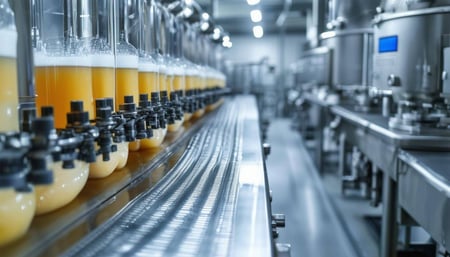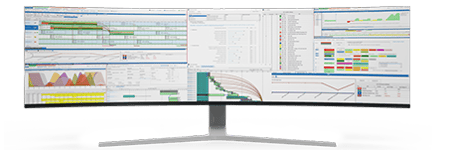Adjusting Cyclic Production in Food & Beverage Manufacturing
In food and beverage manufacturing, cyclic production is a common strategy that ensures products are made in consistent, recurring batches. It is an approach that can stabilize production rates, enhance efficiency, and better manage demand fluctuations for staple products. However, implementing cyclic production in today’s dynamic environment requires precision, foresight, and robust tools.
For production schedulers, balancing cyclic production schedules with the intricacies of real-time demand, raw material availability, and stringent industry standards can be overwhelming. Here’s where integrating advanced planning and scheduling software like PlanetTogether with enterprise systems such as SAP, Oracle, Microsoft, Kinaxis, or Aveva can play a pivotal role.
In this blog, we’ll explore how cyclic production can be streamlined in the food and beverage industry and how PlanetTogether’s integration with major enterprise systems enhances scheduling accuracy, operational efficiency, and responsiveness to market shifts.

Cyclic Production in Food & Beverage Manufacturing
Cyclic production, often seen in high-demand, stable product lines, involves producing specific quantities of items at set intervals. This approach is particularly beneficial in food and beverage manufacturing due to its potential for:
Consistency in product output, reducing the variability in production and ensuring quality control.
Reduced changeover times, as the schedule can minimize downtime between product lines.
Predictable inventory levels, aligning with demand forecasts and preventing stockouts or overproduction.
Enhanced workforce and machine utilization, as employees and machinery operate on a defined cycle, reducing idle times.
However, cyclic production demands flawless execution to avoid costly disruptions, especially when dealing with perishable goods, where maintaining freshness and quality is vital.
Integrating a sophisticated scheduling platform like PlanetTogether with ERP or supply chain solutions such as SAP, Oracle, Microsoft, Kinaxis, or Aveva can simplify the orchestration of cyclic production by enabling seamless data flow, automated scheduling adjustments, and real-time visibility into production variables.


The Role of Integration: PlanetTogether and Enterprise Systems
Scheduling software like PlanetTogether offers comprehensive solutions designed to enhance production planning and scheduling capabilities. When integrated with major enterprise systems, it provides an advanced ecosystem that supports dynamic scheduling based on real-time data.
Real-Time Data Synchronization for Precise Scheduling
By connecting PlanetTogether to ERP systems (e.g., SAP, Oracle) or supply chain platforms (e.g., Kinaxis, Aveva), production schedules can pull real-time data on raw material availability, equipment maintenance schedules, workforce availability, and demand forecasts.
Such data synchronization enables schedulers to make more accurate production decisions, minimize bottlenecks, and adjust schedules as variables change. For example, if a supplier’s delivery is delayed, PlanetTogether, through its integration, can quickly adjust the cyclic schedule to prioritize other products or shift production timelines.
Automated Adjustments to Handle Demand Fluctuations
Food and beverage companies often experience seasonal or event-driven demand changes, requiring agile schedule adjustments. Integrated with ERP or supply chain systems, PlanetTogether can automatically adjust cyclic production based on demand forecasts or order data.
For instance, if demand spikes for a specific beverage due to a holiday, PlanetTogether’s integration can optimize production batches and cycle frequency, ensuring products are readily available without excess inventory. This level of automation is particularly beneficial when handling products with shorter shelf lives.
Enhanced Collaboration Across Departments
Integration between PlanetTogether and systems like SAP or Microsoft Dynamics fosters a collaborative environment where departments such as production, procurement, sales, and logistics can access a unified view of the production schedule.
This collaborative access streamlines the decision-making process, allowing teams to anticipate and resolve issues promptly. Production schedulers, for example, can coordinate with procurement teams to prioritize raw materials for upcoming cycles, reducing the risk of interruptions.
Improved Traceability and Compliance
Traceability is a crucial concern in the food and beverage industry. With PlanetTogether integrated with an ERP or SCM system, data from each cycle is recorded, creating an auditable trail that simplifies compliance with regulatory requirements.
This traceability ensures that if a quality issue arises, it is easy to identify the affected production cycles, raw materials, and processes, enabling swift corrective actions. Additionally, this level of visibility can support quality control teams in monitoring batch quality and consistency.

Key Benefits of Integration for Production Schedulers
Integrating PlanetTogether with SAP, Oracle, Microsoft, Kinaxis, or Aveva offers several advantages that streamline cyclic production and help production schedulers navigate challenges:
Reduced Manual Interventions
The seamless data integration eliminates the need for manual data entry and reconciliation, reducing the risk of errors and allowing schedulers to focus on strategic planning rather than administrative tasks. This leads to more accurate scheduling and reduces the likelihood of disruptions caused by human error.
Enhanced Scheduling Flexibility and Scalability
As production scales or product lines are added, cyclic scheduling becomes more complex. Integration enables PlanetTogether to handle this complexity without requiring significant manual adjustments, supporting rapid scaling while maintaining efficiency and consistency.
Predictive Analytics and Insights
By leveraging the predictive analytics capabilities within ERP or SCM systems, PlanetTogether can provide insights into potential disruptions or demand shifts. This feature is especially beneficial for cyclic production, where anticipating demand cycles or material shortages can significantly impact scheduling accuracy and efficiency.
Sustainability and Waste Reduction
Through optimized scheduling, PlanetTogether can contribute to sustainability efforts by minimizing waste. The integration with ERP or SCM systems helps production planners adjust cyclic production based on real-time data, reducing the likelihood of producing excess quantities or letting perishables go to waste.

Best Practices for Production Schedulers Implementing Cyclic Production with PlanetTogether Integration
Leverage Demand Forecasts to Shape Cycles
Use demand forecasts from your ERP system to adjust cycle timing and quantities proactively. This way, cyclic production is aligned with actual market needs, preventing overproduction and minimizing inventory costs.
Incorporate Preventive Maintenance into the Cyclic Schedule
Collaborate with maintenance teams to integrate equipment maintenance into production cycles. Leveraging data from SAP or Aveva on equipment performance, PlanetTogether can help schedule preventive maintenance to minimize disruptions.
Monitor Raw Material Availability Closely
Keep track of raw material levels through the ERP system to ensure adequate supply for each cycle. By integrating this data into PlanetTogether, production can adjust to any shortages or delays, reducing the risk of interruptions.
Enable Continuous Improvement Through Data Analysis
Analyze the data generated from each production cycle for insights into performance, efficiency, and waste. This analysis can uncover trends that suggest ways to optimize production cycles, reduce waste, and improve sustainability efforts.
For production schedulers in the food and beverage industry, cyclic production is an invaluable approach to stabilizing output and improving operational efficiency. However, executing cyclic production successfully in today’s competitive landscape requires more than a well-defined schedule; it demands agility, precision, and an integrated technology ecosystem.
By integrating PlanetTogether with SAP, Oracle, Microsoft, Kinaxis, or Aveva, schedulers gain access to real-time insights, automated adjustments, and streamlined collaboration across departments, making cyclic production a more powerful strategy than ever before.
With the right integration and practices, production schedulers can not only meet current demands but also position their facilities to respond swiftly to future changes, maximizing productivity while reducing waste and maintaining quality across every cycle.
Are you ready to take your manufacturing operations to the next level? Contact us today to learn more about how PlanetTogether can help you achieve your goals and drive success in your industry.



